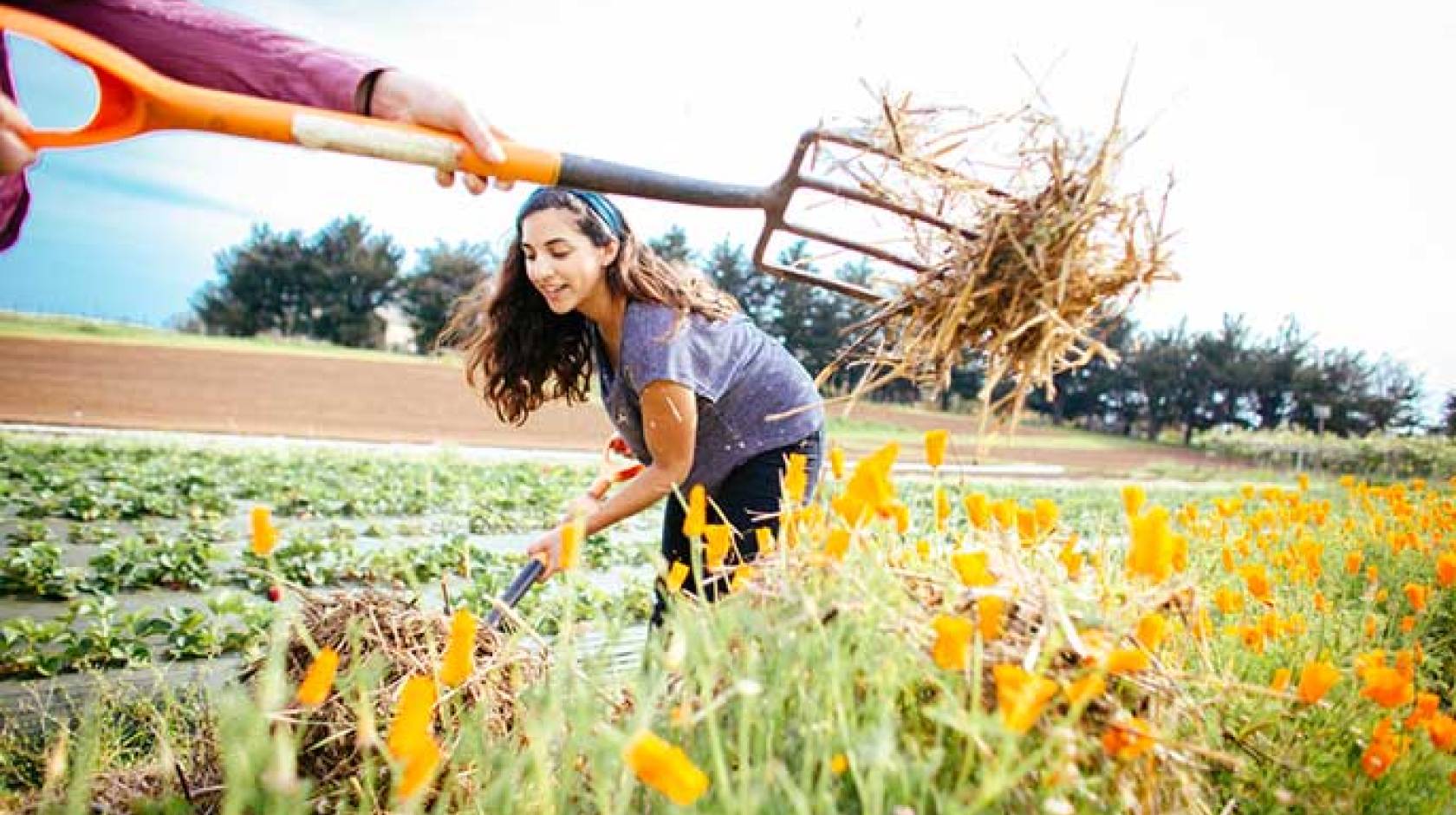Amy Ettinger, UC Santa Cruz

This past winter, UC President Janet Napolitano was eating high-end organic food at legendary Berkeley restaurant Chez Panisse with a group of UC chancellors, an event hosted by famed restaurant proprietor Alice Waters.
Among the topics were population growth, world hunger and sustainable farming practices. Napolitano found the meal and conversation so inspiring that she reportedly started scribbling out ideas for a universitywide compact on a napkin. And then, in a moment that would have made John Hancock proud, all the people at the table signed it.
In July, Napolitano went public with this ambitious plan to develop food practices systemwide, expand classroom offerings about sustainable food, and increase sustainable farming practices at all UC campuses. The UC Global Food Initiative will harness the University of California's resources to address one of the critical issues of our time: how to sustainably, equitably, and nutritiously feed a world population expected to reach 8 billion by 2025.
UC Santa Cruz is poised to play a pivotal role in the movement because the campus is nothing less than "the Mothership" of sustainable agriculture, said Daniel Press, executive director of UC Santa Cruz's Center for Agroecology and Sustainable Food Systems (CASFS).
"There is no other university with such a well-established sustainable agricultural program," said Press. He met with Napolitano in June to discuss how the campus can help push the initiative forward. After all, CASFS has been an epicenter for sustainable farming for more than 45 years, and many of the organic farmers on the West Coast have trained at the center.
Since 1967, UC Santa Cruz has been a destination for those interested in learning organic farming and gardening skills. Trainees have come from around the world. "The training we provide here is being picked up in Latin America, Europe and Asia," said Press.
With its long history as a training ground, CASFS has a national reputation for the skill and knowledge of its instructors and researchers. The center recently received a $4 million gift that is being used to create an endowment to keep CASFS a leader in the sustainable food world. This gift from an anonymous donor is the first step in building a $10 million endowment that will ensure the center's long-term productivity and impact.
Along the way, knowledge and best practices exported from UC Santa Cruz have helped "sustainable" and "organic" go mainstream.
The world has changed since the days when a group of hardworking UC Santa Cruz apprentices set up makeshift tents on the 30 acres of campus land that have become the Farm & Garden.
"Sustainable farming is no longer seen as a 'flaky, hippie' activity," said Press. "The world has taken a different view of organic agriculture than it used to."
Our society has become aware of how food is farmed and where it comes from, and graduates from the CASFS apprenticeship program are changing the food world in the regions where they work, Press said.
Winning over stomachs and minds
While UC Santa Cruz is participating enthusiastically in Napolitano's initiative, it has already established its leadership in sustainability practices, and had been exporting its expertise across the globe long before that fateful "Night of the Napkin" at Chez Panisse.
One of the most important major fronts of the initiative is the dining hall. Alice Waters is famous for her efforts to challenge, and change up, the stereotypically greasy, dreary fare in school cafeterias across California. Producing local fruits and vegetables and serving them in dining halls and cafeterias has become a cornerstone of her Edible Schoolyard project, and is also a key component in the UC Global Food Initiative.
This farm-to-fork philosophy is long established at UC Santa Cruz. The campus's Farm to College program links the campus farm and other local farms to the dining halls and restaurants on campus. In the past decade, UC Santa Cruz's Dining Services has ramped up its "real food" purchases annually, including organically grown products, cagefree eggs, and sustainable seafood.
In spring 2010, UC Santa Cruz undergraduates voted overwhelmingly to approve Measure 43, the Sustainable Food, Health and Wellness Initiative. Measure 43 generates over $100,000 each year from student fees to support a wide variety of education efforts, student grants, and other activities designed to promote a healthy campus food system and enhance students' understanding of their food choices.
"We are reforming institutional food," Press said.
Meanwhile, CASFS graduates are extending this cafeteria-reform effort to the corporate realm. Jered Lawson, a '94 CASFS graduate and co-founder of the Pescadero working/ teaching farm Pie Ranch, is partnering with Google and LinkedIn to develop stronger relationships between their cafeterias and local production of nutrient-dense foods.
Lawson is paying it forward by training the next generation of sustainable farmers. Pie Ranch offers a year-long apprentice program and works with high school kids from San Francisco, Pacifica, and Pescadero.
Lawson is drawn to educating teens about food and social justice because he grew up in Los Angeles, where "the disconnect between people and the resources that sustain them was painfully obvious."
As an undergraduate at UC Santa Cruz, Lawson (Kresge '92, community studies) read Wendell Berry's "The Unsettling of America: Culture and Agriculture," which includes an impassioned defense of locally based, diversified farm and food systems in the face of mono-crop, industrial-scale production geared for export. The book, first published in 1977, had a profound influence on his life and his work today.
"That book helped me see how many of the solutions for the challenges the world was facing have a basis in agriculture," Lawson said.
Exporting best practices
The UC Global Food Initiative wants to do more than just improve the health and quality of campus foods, and upgrade sustainability practices on campus. Another of its goals is to have UC graduates sustain and export those practices throughout the world.
One recent example is the acclaimed urban farmer Karen Washington, a 2008 graduate of the Apprenticeship in Ecological Horticulture at CASFS who is one of five winners of a James Beard Foundation Leadership Award.
A native New Yorker, she returned to the Bronx after her apprenticeship and has won acclaim for her work to revitalize the area with urban gardens, as well as for national efforts to promote green jobs, healthy diets, and community gardens. Washington, who has been farming since she was 8 years old, was honored by Michelle Obama at the White House in 2010.
"The apprenticeship was one of the best experiences I ever had," said Washington. "It got me connected to the land. My time at UC Santa Cruz got me looking at food systems.… I came back to the Bronx energized and ready to kick butt."
Washington gives workshops on vegetable production and food advocacy — ideas that were at the center of her curriculum at UC Santa Cruz.
"I highly recommend the program to anyone who can do it. It's a family. I'm still connected to my classmates. It inspired me to be the person I am today in the food movement."
Supporters of the UC Global Food Initiative hope to have a positive impact across the world. Participating campuses are not afraid to ask themselves daunting questions, including whether it's even possible to sustainably and nutritiously feed a world population of 8 billion.
That is a question that CASFS alumni are exploring in far-flung places. Godfrey Kasozi, executive director of the Centre for Environment in western Uganda, is working to create a more sustainable economy and environment within his native country. He came to UC Santa Cruz as a CASFS apprentice in 1999 and returned to Uganda to train farmers in sustainable agriculture. He's also worked with small-scale farmers to establish their own gardens.
His intensive training at UC Santa Cruz is paying off now. "The Centre for Environment has increased income and food production to families in the region," he said.
Seeking alternatives in the growing fields
Individual activists are working hard to bring about social change through food. But it takes more than education and hard work to change how food is grown worldwide. CASFS staff members are also contributing to the Global Food Initiative through their cutting-edge research, including their development of alternatives to methyl bromide, a gas that is used to kill pests in growing fields.
For the last 50 years, methyl bromide has been almost ubiquitous. "Chemical fumigation has been used as the major tool for controlling soil-borne diseases and weeds in fruit and vegetable production all over the world," said Joji Muramoto, associate researcher in the Department of Environmental Studies.
But strong environmental and health concerns have led to heavy regulation. Research by Environmental Studies Professor Carol Shennan and Muramoto conducted at the UC Santa Cruz Farm has shown promising results with alternative approaches. One technique, known as anaerobic soil disinfestation (ASD) reduces pathogens for strawberries by creating a fermentation process in the soil. Researchers introduce a carbon source such as rice bran, chopped-up cover crops, or molasses to the strawberry bed, then irrigate and tarp off the beds to keep soil-borne diseases at bay.
The method has been tested for the past several seasons at the Farm and commercial fields across the California coast, and the results are promising: the technique has been shown to control the soil pathogen Verticillium dahliae, a major disease of strawberries. Now, ASD is being implemented in strawberry and cane berry fields in coastal California. It was used in 123 acres in 2012–13, and 430 acres in the 2013–14 season. Researchers expect its use and impact to keep growing.
Shennan and Muramoto, said Press, "are working on techniques for growing strawberries that are really revolutionary."
Amy Ettinger is a freelance writer based in Santa Cruz.

